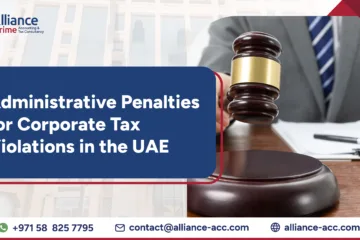The UAE’s Ministry of Finance made a significant announcement in January 2022, paving the way for the implementation of Corporate Tax in United Arab Emirates. Set to be effective from June 1, 2023, the Corporate Income Tax is a direct tax imposed on business income.
While the introduction of Corporate Tax in UAE might appear to be a novel development, it is essential to recognize that this practice is not unique to the UAE and is indeed prevalent in several other countries, including the US, India, France, and some other Gulf Cooperation Council (GCC) nations such as Oman, Kuwait, and Qatar. Notably, the UAE’s Corporate Tax rate is set at an impressive 9%, the lowest compared to the rates in other nations.
Understanding Corporate Tax in UAE
Corporate Tax in UAE is a direct tax levied on the taxable income of entities, calculated based on various adjustments to the net income or profit of corporations and businesses. The applicability of Corporate Tax extends to a range of entities, including residents, juridical persons incorporated in the UAE, natural persons conducting business in the UAE, foreign juridical persons managed and controlled in the UAE, and non-residents with certain ties to the UAE, such as a permanent establishment or income sourced from the UAE. It is imperative for businesses to comprehend the scope of Corporate Tax and evaluate its impact on their operations to ensure compliance with the relevant regulations.
Administration and Implementation
The responsibility for the administration, collection, and enforcement of Corporate Tax in UAE falls under the purview of the Federal Tax Authority. Meanwhile, the Ministry of Finance retains its role as the competent authority for handling bilateral or multilateral agreements and facilitating the international exchange of information for tax purposes.
Economic Implications of Corporate Tax in UAE
The introduction of Corporate Tax in UAE is expected to bolster the nation’s economy by reinforcing corporate governance and promoting sustainable economic transformation. Considered a pivotal step toward the country’s economic diversification and growth, Corporate Tax has been positioned as a catalyst for positioning the UAE as a leading global hub for business and investment. Furthermore, this move underlines the UAE’s commitment to upholding international standards for tax transparency and preventing unlawful tax practices.
Exemptions and Applicability
Certain entities are exempt from Corporate Tax in UAE, subject to meeting specific conditions outlined in the law. These exemptions include government entities, government-controlled entities, certain businesses engaged in extractive and non-extractive activities, qualifying investment funds, qualifying public benefit entities, and pension or social security funds. Furthermore, small businesses meeting the revenue threshold specified by the authorities can avail of ‘small business relief,’ which exempts them from paying Corporate Tax and entails simplified compliance obligations. As the details regarding the revenue threshold for small business relief are yet to be specified, businesses should remain vigilant and stay informed about the evolving regulatory landscape.
While businesses with a net profit exceeding 375,000 AED are subject to Corporate Tax, specific categories are exempt from this obligation. Notably, individuals deriving income from employment, real estate, or personal investments unrelated to a trade or enterprise in the UAE are exempt from Corporate Tax. Additionally, foreign investors who do not conduct business operations in the UAE are also not liable for Corporate Tax. Certain categories, such as qualifying free zone businesses and income from qualifying shareholdings, enjoy exemptions from Corporate Tax, subject to meeting specified criteria outlined by the law.
Deductible and Non-deductible Expenses under Corporate Tax in UAE
Corporate Tax regulations in the UAE dictate a set of rules governing the deductibility of various expenses. While certain expenses are eligible for deductions, others are explicitly excluded from the computation of taxable income. Expenses such as depreciation or amortization costs for capital assets, business setup expenses, and certain interest costs on debt funding may be deductible. On the other hand, any expenses incurred for receiving exempt income, losses not linked to the business, or additional expenses not compliant with the established regulations may not be deductible for Corporate Tax purposes.
Corporate Tax Rates in UAE and Filing Process
The Corporate Tax rate in the UAE stands at 9% for taxable income above 375,000 AED, while businesses with a net profit below this threshold are not subject to Corporate Tax. Corporate Tax is computed based on the net profit recorded in a company’s financial accounts, ensuring a transparent and straightforward calculation process. The filing of Corporate Tax returns in the UAE is carried out through a self-assessment mechanism, requiring businesses to file their tax returns with the Federal Tax Authority within the stipulated time frame.
However, it is essential to stay updated on any further clarifications and supplementary guidelines provided by the UAE Ministry of Finance to ensure a comprehensive understanding of the tax regime and its implications for businesses operating in the UAE.
Maintaining Financial Records
UAE businesses are expected to maintain comprehensive financial records in compliance with Corporate Tax regulations. These records provide essential documentation for the filing of Corporate Tax returns and play a crucial role in ensuring transparency and accuracy in tax-related proceedings. The precise documentation requirements may vary, but they typically involve detailed financial reports, trade license copies, owner/partner details, and other relevant information essential for tax compliance and reporting.
UAE Corporate Tax in Free Zones
The introduction of Corporate Tax in UAE also impacts businesses operating within free zones, albeit with certain variations. Qualifying Free Zone Persons (QFZPs) may be subject to Corporate Tax but are eligible for a 0% tax rate provided they meet specific criteria regarding substance maintenance, income eligibility, and compliance with transfer pricing requirements. Businesses within free zones need to carefully evaluate their status as QFZPs to determine their tax obligations accurately.
Qualifying Free Zone Persons have the opportunity to benefit from a 0% Corporate Tax rate, provided they meet specific conditions, including maintaining sufficient substance in the UAE, deriving qualifying income, complying with transfer pricing regulations, and meeting additional criteria prescribed by the Ministry of Finance. Businesses operating in free zones should ensure strict adherence to the conditions stipulated under the Corporate Tax Law to avail themselves of the preferential tax rate and maintain compliance with regulatory requirements.
Adapting to the Changes
As the UAE implements Corporate Tax, businesses must proactively assess the impact of the new tax regime on their operations and prepare themselves to fulfill the compliance and reporting obligations associated with Corporate Tax. This proactive approach involves a comprehensive review of business activities, ensuring operational readiness to manage tax-related compliance, and maintaining meticulous documentation from a Corporate Tax perspective. By remaining proactive and well-informed, businesses can navigate the evolving tax landscape in the UAE effectively and contribute to the sustainable growth of their enterprises.
Taxable Income and Deductions
The CT regime in the UAE determines taxable income based on the net profit or loss as stated in the financial statements prepared in accordance with UAE-accepted accounting standards, typically International Financial Reporting Standards (IFRS). However, the CT Law restricts the deduction of certain expenses to ensure that tax relief is only granted for business-related expenditures. Additionally, it prescribes adjustments to the accounting net profit for various items, including unrealized gains/losses, exempt income, transfer pricing adjustments, and special reliefs for qualifying business activities, among others. These provisions aim to simplify the tax calculation process and ensure a fair and accurate assessment of taxable income.
Impact of International Tax Developments
As a member of the OECD Inclusive Framework on BEPS, the UAE is expected to adopt the GloBE (Global Anti-Base Erosion) rules proposed under Pillar Two, which target large multinational groups with a global minimum effective tax rate of 15%. While the CT Law currently lacks specific provisions on Pillar Two, the impact of these rules is expected to influence UAE-based multinational groups, especially in jurisdictions where their subsidiaries operate.
Administrative Provisions and Compliance
The CT Law introduces specific administrative provisions that require taxable persons to maintain transfer pricing documentation and records for a minimum of seven years. These measures aim to streamline compliance and ensure transparency in transactions and arrangements with related parties and connected persons. The authority responsible for the administration and enforcement of the CT Law is the Federal Tax Authority, while the Ministry of Finance remains the competent authority for international tax agreements and information exchange.
Advanced Pricing Agreements and Tax Assessments
The Corporate Tax Law allows businesses to seek clarifications or request advance pricing agreements from the relevant authority. This provision ensures that businesses can obtain guidance on tax matters and foster a more transparent and cooperative relationship with the tax authorities. Additionally, non-compliance with the Corporate Tax Law may lead to penalties and fines in accordance with the Tax Procedures Law.
Seeking Expert Assistance
Navigating the complexities of Corporate Tax in UAE necessitates expert guidance and support. With the intricate nuances of tax laws and regulations, businesses can benefit significantly from the services of experienced accounting and tax consultancy firms. Alliance Prime, a leading accounting and tax consultancy firm in the UAE, stands as a trusted partner for businesses seeking comprehensive solutions and expert guidance in managing Corporate Tax compliance and reporting obligations.
With a commitment to delivering tailored services tailored to each client’s specific needs, Alliance Prime offers a wealth of expertise and knowledge to ensure seamless navigation of the Corporate Tax landscape in the UAE.
For comprehensive assistance and reliable support in managing your Corporate Tax obligations, visit Alliance Prime at https://alliance-acc.com/ or reach out to their team of seasoned professionals for personalized consultation and guidance. With Alliance Prime, you can ensure a smooth and hassle-free experience in addressing your Corporate Tax requirements and optimizing your business operations in the UAE.
Looking Ahead
While the introduction of corporate tax in UAE represents a significant shift in the country’s tax landscape, the government’s commitment to maintaining a business-friendly environment is evident in the thoughtful design of the Corporate Tax Law. With its relatively low tax rates and a compliance-friendly approach, the UAE continues to position itself as an attractive destination for businesses and foreign investors seeking a favorable tax environment.
For businesses operating in the UAE, understanding the intricacies of the Corporate Tax Law is vital to ensure compliance and navigate the evolving global tax landscape. As the Corporate Tax Law continues to evolve and new provisions and clarifications are introduced, staying informed and seeking guidance from experienced tax professionals will be instrumental in managing the tax implications effectively.
Alliance Prime, a leading accounting and tax consultancy in the UAE, is dedicated to helping businesses navigate the complexities of the UAE’s corporate tax regime. With our expertise and in-depth knowledge of the Corporate Tax Law, we are committed to assisting businesses in understanding and complying with the regulations while optimizing their tax positions. For more information and personalized assistance, please visit our website at https://alliance-acc.com/.
Why is Alliance Prime the best Tax Consultancy in Dubai?
Alliance Prime is a leading provider of auditing, accounting, taxation, and advisory services in the UAE. Our expert team will guide you through the complex laws and regulations of UAE, including Corporate Tax, VAT, Excise Tax, Accounting and Bookkeeping, ESR, Financial Advisory, ERP, etc. We stay up-to-date with the latest changes in laws and regulations in the UAE. If you’re looking for reliable and professional auditing, accounting, taxation, and advisory services in the UAE, look no further than Alliance Prime.
To Book a Free Consultation, contact us on: at- +971 58 825 7795 or Email us at:- contact@alliance-acc.com




